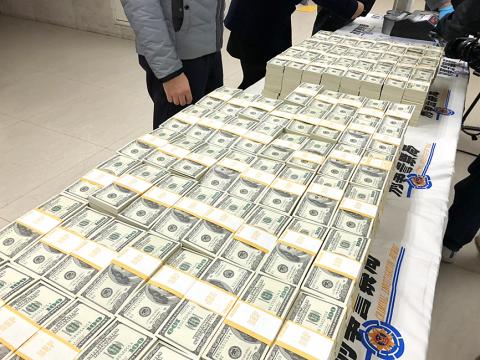The Criminal Investigation Bureau (CIB) and the New Taipei City District Prosecutors’ Office yesterday announced that they had broken up a counterfeiting ring, detained five suspects and seized forged US currency which had reportedly fooled some local banks.
Raids carried out over the past month had seized a total of US$11.04 million in counterfeit US$100 bills, making it one of the largest forgery cases in the nation’s history, CIB investigator Hsu Chao-pin (徐釗斌) said.
The forged notes were of high quality, with the smaller detectors used in some local banks indicating they were authentic, although the bills could not trick larger, standard detectors, CIB Forensic Examination Division head Yeh Chia-yu (葉家瑜) said.

Photo: Chiu Chun-fu, Taipei Times
Because of the sophisticated printing and engraving technology used, the bureau invited a US Secret Service specialist in counterfeit money to travel to Taiwan from Hong Kong to examine the forged notes, Yeh said.
The examination showed that the seized banknotes were from the same batch as money seized in a 2006 case where a Taipei branch of Mega Bank (兆豐銀行) lost NT$66 million (US$2.16 million at the current exchange rate) due to forged US$100 bills, Yeh said.
Nine people had been arrested and tried for the 2006 counterfeit operation, but prosecutors would not rule out that the two cases are related, with those detained over the past month also having been involved in the earlier case.
Last night, a judge ruled that a man surnamed Liao (廖), 64, the apparent leader of the counterfeit ring, as well as a man surnamed Chueh (闕), 58, and three other suspects should remain in detention due to the seriousness of the crime, as well as the risk they would flee the country, collude and tamper with the evidence, Hsu said.
Prosecutors said the suspects could be charged with counterfeiting valuable securities under the Criminal Code.
After receiving tip-offs, investigators put the group under surveillance and tracked their movements over six months, before conducting four raids over the past month, detaining suspects in Taipei, New Taipei City’s Sanchong District (三重), Taoyuan and Changhua County.
Besides the fake US$100 bills, the raids also netted a batch of fake US dollar straps — bands for holding a single denomination of notes together — along with the engraving ink used, but Hsu said that they did not find the engraving molds or printing presses.
Liao produced the bills and passed them on to Chueh, who allegedly sold the forged bills to friends at local markets for NT$350 to NT$450 each, investigators said, adding that Chueh told the buyers that the bills would pass for the real thing at currency exchange oulets in foreign nations.
Chueh told the buyers that it was best to spend or exchange the bills at casinos, gambling dens, hotels and entertainment clubs in Southeast Asian nations, investigators said.

Tropical Storm Gaemi strengthened into a typhoon at 2pm yesterday, and could make landfall in Yilan County tomorrow, the Central Weather Administration (CWA) said yesterday. The agency was scheduled to issue a sea warning at 11:30pm yesterday, and could issue a land warning later today. Gaemi was moving north-northwest at 4kph, carrying maximum sustained winds near its center of up to 118.8kph and gusts of 154.8kph. The circumference is forecast to reach eastern Taiwan tomorrow morning, with the center making landfall in Yilan County later that night before departing from the north coast, CWA weather forecaster Kuan Shin-ping (官欣平) said yesterday. Uncertainty remains and

SEA WARNING LIKELY: The storm, named Gaemi, could become a moderate typhoon on Wednesday or Thursday, with the Taipei City Government preparing for flooding A tropical depression east of the Philippines developed into a tropical storm named Gaemi at 2pm yesterday, and was moving toward eastern Taiwan, the Central Weather Administration (CWA) said. Gaemi could begin to affect Taiwan proper on Tuesday, lasting until Friday, and could develop into a moderate typhoon on Wednesday or Thursday, it said. A sea warning for Gaemi could be issued as early as Tuesday morning, it added. Gaemi, the third tropical storm in the Pacific Ocean this typhoon season, is projected to begin moving northwest today, and be closest to Taiwan on Wednesday or Thursday, the agency said. Today, there would likely

DISRUPTIONS: The high-speed rail is to operate as normal, while several airlines either canceled flights or announced early departures or late arrivals Schools and offices in 15 cities and counties are to be closed today due to Typhoon Gaemi, local governments announced last night. The 15 are: Taipei, New Taipei City, Taoyuan, Tainan, Keelung, Hsinchu and Kaohsiung, as well as Yilan, Hualien, Hsinchu, Miaoli, Chiayi, Pingtung, Penghu and Lienchiang counties. People should brace for torrential rainfall brought by the storm, with its center forecast to make landfall on the east coast between tonight and tomorrow morning, the Central Weather Administration (CWA) said. The agency issued a sea warning for the typhoon at 11:30pm on Monday, followed by a land warning at 11:30am yesterday. As of

CASUALTY: A 70-year-old woman was killed by a falling tree in Kaohsiung as the premier warned all government agencies to remain on high alert for the next 24 hours Schools and offices nationwide are to be closed for a second day today as Typhoon Gaemi crosses over the nation, bringing torrential rain and whipping winds. Gaemi was forecast to make landfall late last night. From Tuesday night, its outer band brought substantial rainfall and strong winds to the nation. As of 6:15pm last night, the typhoon’s center was 20km southeast of Hualien County, Central Weather Administration (CWA) data showed. It was moving at 19kph and had a radius of 250km. As of 3pm yesterday, one woman had died, while 58 people were injured, the Central Emergency Operation Center said. The 70-year-old